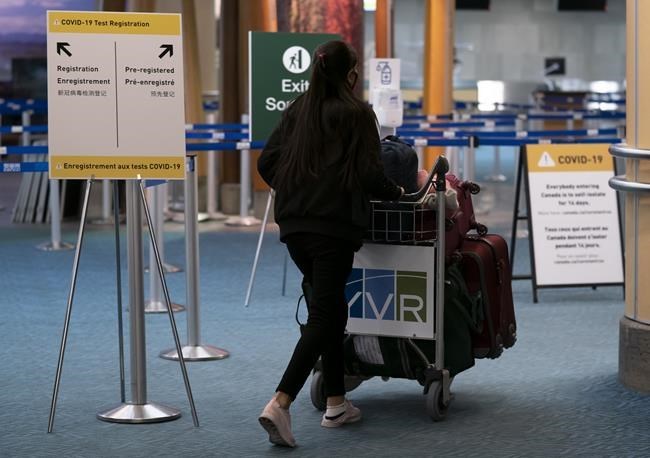TORONTO — Unions representing airport security screeners say turnover for new employees is high despite efforts to hire more workers, with as few as one in three recent hires still on the job in some regions.
Major delays and flight cancellations at airports across Canada earlier this year drew scrutiny from passengers and politicians alike. Among other measures to ease the chaos, the government promised to ramp up hiring of security screeners — and did so, with more than 2,000 new screeners hired since April.Â
Now the pressure is on for airports to have a smooth holiday season, but high turnover and widespread bargaining between security screeners and their employers could throw another wrench into operations.Â
David Lipton with the United Steelworkers union, which represents about 2,000 airport security screeners at 41 airports, said only about a third of the screeners hired in the past few months have stayed on, with the rest either quitting, leaving during the training period or not showing up to training. Other unions reported similar turnover levels for recent new hires.Â
For example, Lipton said the Ottawa airport needs between 350 and 380 workers to be adequately staffed, though security employer GardaWorld disputed this, saying their target is below 350. Right now, Ottawa has around 270, up from around 200 earlier this year, Lipton said.
Security screeners at Canadian airports work for third-party contractors hired by the Canadian Air Transport Security Authority (CATSA). There are three main contractors providing screeners at airports across Canada: Allied Universal, Securitas and GardaWorld.Â
CATSA said the average reported attrition rate for security officers during the quarter ended Sept. 30 was 12.2 per cent. Spokesperson Suzanne Perseo said the agency is ready for the upcoming holiday season.Â
Both GardaWorld and Allied Universal both said they are well staffed, with GardaWorld increasing hiring for the holiday, while Securitas declined to comment, citing ongoing bargaining.
Almost all of the security screeners covered by USW are currently in bargaining with their employers, said Lipton. Among them are the Quebec and Atlantic Canada screeners, who recently rejected an offer from Securitas, and workers at the Ottawa airport who are bargaining with GardaWorld, he said.
Lipton said inflation has made current wages for security screening less attractive, making it harder to retain workers.Â
“In the times of high inflation, the workers require more of a raise just to make ends meet,” he said.
But he said working conditions are also driving people away as with fewer workers, the shifts are longer and more stressful.Â
Keith Aiken with the International Association of Machinists and Aerospace Workers (IAMAW), which represents thousands of security screeners in B.C. and Ontario, including the ones at Toronto’s Pearson Airport, didn’t give specifics but said the turnover rate for security screeners is “very high.” He attributed turnover at Pearson to scheduling and working conditions.Â
“Our pre-board screeners are highly monitored in a stressful environment and this causes new workers to not want to do the job,” said Aiken in an emailed statement.Â
The office of the transport minister acknowledged that like other sectors, CATSA is currently facing higher levels of staff turnover.
But spokeswoman Nadine Ramadan said CATSA has achieved pre-pandemic staffing levels at major airports and is entering the holiday season with lower wait times. For example, she said at Pearson, CATSA is 25 per cent above pre-pandemic staffing levels, including turnover.Â
But the new hires who stay are facing backlogs in the CATSA-provided training process, said IAMAW’s Aiken.
Aiken said that means many new hires can only do certain tasks, and not full screening duties.Â
CATSA's Perseo said the screening authority modified its training earlier this year to "accelerate screening officer readiness while prioritizing security effectiveness."Â
That means some new recruits are performing non-screening functions in the queues to optimize staffing. She also said CATSA has added more trainers.Â
COVID-19 has changed the reality for workers, said Catherine Cosgrove of Teamsters Canada, which represents around 1,000 GardaWorld screening workers across the country, including in Winnipeg and Edmonton.
“Turnover right now is widespread,” she said of the screening industry, agreeing that around a third of new hires from the past few months are still on the job.Â
Screeners at the Edmonton airport signed a deal in September with a 12 per cent wage increase over two and a half years after voting for strike action in July. Â
But despite those gains, Cosgrove said she thinks worker retention is going to be a persistent problem in the industry.Â
If bargaining goes south heading into the holiday season, USW screeners may not be able to strike, noted Lipton — the unions are awaiting a decision from the Canada Industrial Relations Board to determine whether they have a right to strike depending on how much of their job is considered essential.
USW is calling on the government to increase funding for CATSA’s screeners, as they say the employers are citing funding restrictions in their third-party contracts as a reason for not being able to offer better deals at the bargaining table.
CATSA did not comment on its funding but said it's confident the contractors can work with the unions to reach agreements, while the transport minister’s office said the government has not cut or decreased funding for CATSA staffing.Â
But Lipton said more is needed.
“I think that a major issue here is that CATSA needs to adequately fund screening operations so that the screening contractors can pay proper wages to these people and stabilize the workforce,” Lipton said.
This report by The Canadian Press was first published Nov. 10, 2022.
Rosa Saba, The Canadian Press




